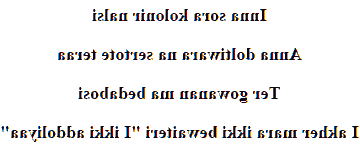Nubian love poem
Kolonni
Inna sora kolonir nalsi
Anna doltiwara na sertote teraa
Ter gowanan ma bedabosi
I akher mara ikki bewaiteri "I ikki addoliyaa"


→ French poem ←
Kenzi Nubian language
Translation into Nubian (other possible names : Kenzii, Kenzi, Kunuz Nubian, Kunuz, Kunuzi, Nobiin, Kenuzi, Kenuz, Autonym : Mattokki), of my love poem. Here it's in kenzi (Mattokki) the language of 40,000 speakers, and this translation come from Egypt.
Nubian is a Nilo-Saharan language, from the northern branch of the Eastern Sudanese group. The Nubian language descends in a direct line from the ancient Nubian which was spoken and written still 6 centuries ago.
The old Nubian, attested from the 8th century, has left us numerous literary and documentary texts.
The Nubian languages close to this old Nubian, are the Nubian languages of the Nile, Andaandi (Dongolawi), Mattokki (Kenzi) and Nobiin, as well as the western Nubian languages (Birgid and Midob), and a group of Nubian Kordofan languages.
When we speak of Nubian we are actually talking about a set of languages spoken in eastern Darfur, north of the Nuba mountains and in the Nile valley in the southern region of Egypt and northern Sudan.
To be precise, the Fadija speak Nobiin, the Kunuz speak Mattoki, which is the language presented here, and these two languages are not mutually intelligible, although they both belong to the group of the Nubian language of the Nile.
We can write Nubian with different alphabets, a modified Coptic alphabet, the Latin alphabet and as here with the Arabic alphabet, and it is precisely in East Africa that we find languages that have been written; the Nubian is one of them for millennia. We have documents in old Nubian, written in a hieroglyphic alphabet, as well as adapted Coptic alphabet, which date from the 8th century.
The Nubian civilization was born around the prosperity of the Nile valley, between the first cataract of southern Egypt and northern Khartoum in Sudan. Since Pharaonic times, the country of this civilization has been known for its riches in gold; the word nub meaning "gold".
The Islamization of Nubia began in the Middle Ages, to reach its fullness during the collapse of Dongola (Christian kingdom north of Nubia). This Islamization with the Arabic language, will have had influences on the Nubian languages and in the 16th century, on the end of the old Nubian writing.
Today, Arabic is the language of education in Egypt and Sudan, two monolingual countries that have long ignored cultural and linguistic diversity ... so what will happen to Kenzi?